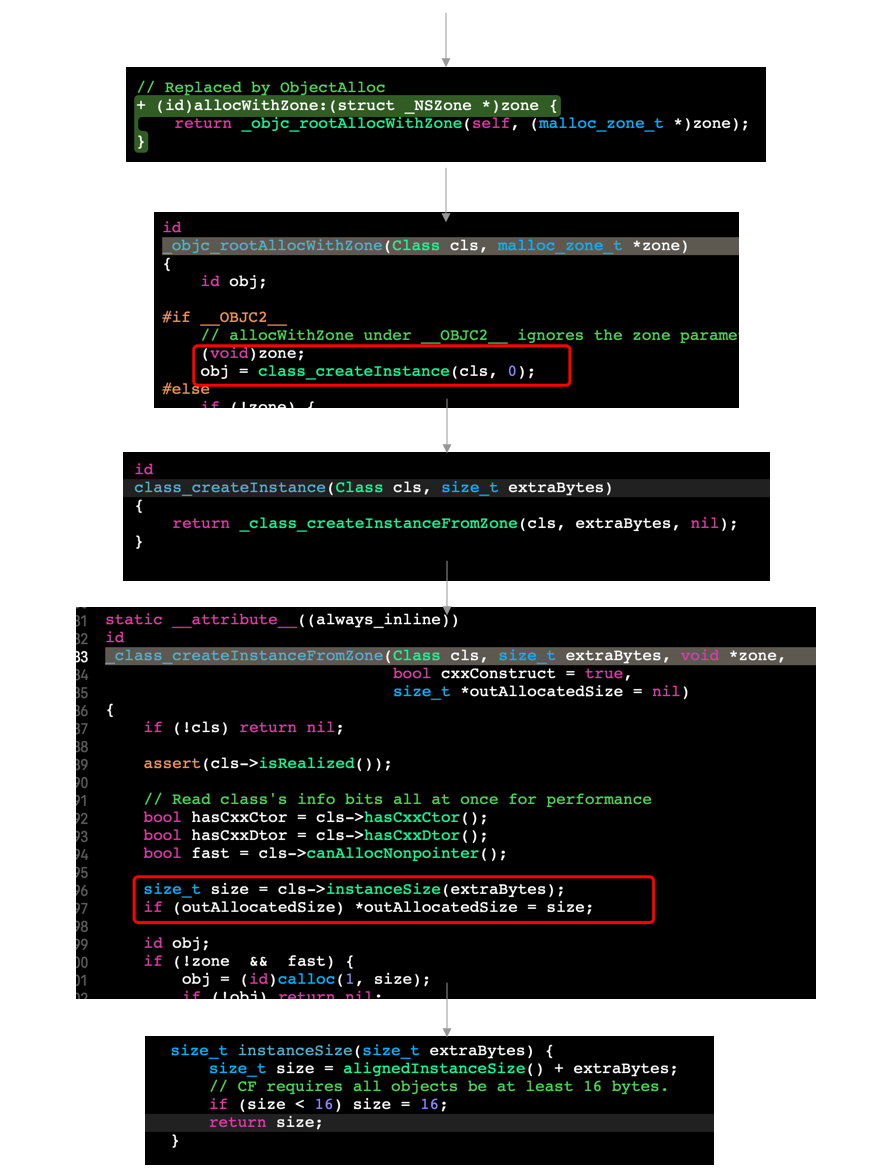Objective-C 对象的本质
OC的类是使用C/C++的结构体来实现的
可以在terminal中运行如下代码, 把OC代码转换成c++代码,方便研究
xcrun -sdk iphoneos clang -arch arm64 -rewrite-objc objcFile.m -o objcFile_arm64.cpp
NSObject
一个NSObject对象占用多少内存?
- 系统分配了16个字节给
NSObject对象(通过malloc_size函数获得)// 获取指针指向地址占用内存的空间 16 NSLog(@"Malloc size -> %zd", malloc_size((__bridge void *)obj)); - 但
NSObject对象内部只使用了8个字节的空间(64bit环境下,可以通过class_getInstanceSize函数获得)NSObject *obj = [[NSObject alloc] init]; // 获取实例占有内存的空间 8 NSLog(@"NSOject instance size -> %zu", class_getInstanceSize([NSObject class]));
查看源码,可以看到OC对象的最小占用空间是 16 bit,不足 16 bit 时补足到 16 bit.

对象继承
定义一个People类继承NSObject
@interface People : NSObject
{
@public
int _age;
int _version;
}
@property(nonatomic, assign) NSInteger height;
@end
@implementation People
@end
上面的类转化成C代码如下
struct NSObject_IMPL {
Class isa;
};
struct People_IMPL {
struct NSObject_IMPL NSObject_IVARS;
int _age;
int _version;
NSInteger _height;
};
// @property(nonatomic, assign) NSInteger height;
/* @end */
// @implementation People
static NSInteger _I_People_height(People * self, SEL _cmd) { return (*(NSInteger *)((char *)self + OBJC_IVAR_$_People$_height)); }
static void _I_People_setHeight_(People * self, SEL _cmd, NSInteger height) { (*(NSInteger *)((char *)self + OBJC_IVAR_$_People$_height)) = height; }
// @end
People的结构体里边有当前类声明的属性,还有来之父类结构体 NSObject_IMPL,存到了一个属性 NSObject_IVARS 中,而 People的 set,get方法都定义为静态函数,跟 People 关联起来
People 占用的内存大小,Class(8)+ int(4)+ int(4)+ NSInteger(8) = 24,从结构体的计算方式可以得出这个结果
class_getInstanceSize([People class]) -> 24
但是实际分配的内存是 32
People *p = [[People alloc] init];
malloc_size((__bridge void *)p) -> 32
这个因为OC的内存分配机制导致的, OC类的实际内存大小都是 16 的倍数
sizeof, class_getInstanceSize, malloc_size 的比较
sizeof(p) -> 8
class_getInstanceSize([People class]) -> 24
malloc_size((__bridge void *)p) -> 32
sizeof 获取变量类型的空间,这里 p是8位的指针
class_getInstanceSize 获取实例变量实际使用的空间
malloc_size 获取变量在内存中实际分配到的空间
reference: apple objc4 源码